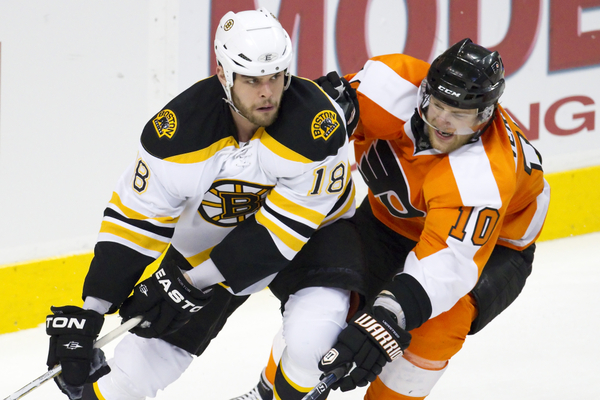
A day later and the sting has worn off a bit from the Boston Bruins early exit from the 2012 Stanley Cup playoffs. The significantly favored B’s dropped a seven-game series to the Washington Capitals.
Why did the B’s lose?
First of all, the Bruins (like many teams) were dealing with significant absences and injuries. During the series, Patrice Bergeron suffered an oblique injury which mitigated his effectiveness and prevented him from taking faceoffs. Tyler Seguin had a hand injury that will require surgery in the offseason. The Bruins were without Adam McQuaid for the whole series and Joe Corvo for the end.
Most significantly, the Bruins were without Nathan Horton. Out from late January-on with post-concussion symptoms caused by a second head injury in under a year, the B’s right-winger was a major absence in the B’s lineup.
His value has been debated extensively but his five-on-five production over the past two seasons is among the best in the game. He’s also elite terms of shot production. He was on-pace for 30 goals this season and could have made the difference in a seven-game series decided by an overtime goal (especially with his two overtime playoff game-winners and two game-seven winners).
Much has been said about Horton’s contribution to Boston, but one statistic stands:
This Season w/Horton: 46 games, 163 goals (3.54 G/g)
This Season w/o Horton: 43 games, 113 goals (2.63 G/g)
Whether that dip can be solely placed on the power forward’s shoulders is another question entirely, but it’s pretty incriminating.
Plenty can also be said about the absences of certain individuals from the 2011 Cup run: Mark Recchi, Michael Ryder and Tomas Kaberle (wait…scratch that last one…). There’s significant respect for the B’s current leadership group (Zdeno Chara, Bergeron, Andy Ference, Shawn Thornton and Chris Kelly) but Recchi was a legend. What he said held huge weight in that locker room – his absence can’t be discounted. Ryder’s clutch depth scoring would have been very useful.
Of course the trouble started with their offense; the B’s managed just fifteen goals in seven games. They averaged well over thirty-five shots a night but were held to a single tally in more than half of the games in the series.
Their usual clutch playoff performers couldn’t put the puck in the net. David Krejci, Milan Lucic and Patrice Bergeron all entered the 2012 postseason with more than thirty career postseason points. Combined, they managed one goal and eight points in seven games. That just doesn’t cut it. Brad Marchand, who was outstanding last spring, had just two points.
The Caps conservative defensive zone play effectively neutered the B’s formerly vaunted offense. Much credit has to be given to Dale Hunter for designing a system to neutralize what was the NHL’s second-ranked attack during the regular season. More is owed to Braden Holtby: Despite being a rookie, he proved he was the real deal and capably denied key opportunity after opportunity, frustrating the Black and Gold.
Boston’s failures on the powerplay (8.7%) didn’t help matters. Both Peter Chiarelli and Claude Julien acknowledged the issue in their post-season press conference. It’s hard to determine if it’s a personnel issue or a system/coaching one – but given the talent level the B’s boast, most point to the latter.
In the end, Lady Luck was just not on their side. Too many excellent scoring chances negated, and a depressing team shooting percentage (6.05%) as the result. Seven one-goal games. Seven. The Bruins could have just as easily swept the Caps (or been swept themselves).
However they lost, the Bruins’ future is still bright as any in the game. They possess tremendous talent and youth up front, several solid and secure defensemen (including the best in the game, Chara), a pair of outstanding goaltenders and one of the best prospects in the world, Dougie Hamilton. The B’s should be prime contenders for the next half decade – or more.
For the Eeyores in the B’s fanbase, they can look ahead to brighter days or pop in their 2011 Stanley Cup DVD for some treasured memories.